Secondary Plant Compounds
All information about "Secondary Plant Compounds" and the related magazine articles can be found here.
Our articles are written clearly and link to scientific studies where relevant. This is how we meet our own standards: we regularly deliver new, high-quality content for you—free of charge, no sign-up required, with the highest possible benefit to you.

Start spring naturally fit with L-citrulline & cordyceps and recharge your batteries
Experience the invigorating power of nature and science. For new energy, strong blood vessels and mental freshness. Ideal for anyone who wants to get off to a powerful start.
The days are getting longer, the light is returning and now is the time to give your body a gentle boost. The combination of L-citrulline, an amino acid that promotes blood circulation, and the vital mushroom cordyceps supports you in a natural way. For more performance, better focus and an all-round vital body feeling.

Moving through spring: supporting joints naturally with MSM, glucosamine and chondroitin
Find out how your joints work - and how targeted nutrients, exercise and high-quality supplements can promote your mobility.
Movement is often difficult after winter. Stiff joints and limited range of motion are not uncommon. Natural active ingredients such as MSM, glucosamine and chondroitin can help to support normal joint function and prevent discomfort. Now is the ideal time to get going with renewed energy. Moving, vital and well nourished into spring.

Vitamin D3 and K2: the perfect combination for bones and well-being
Find out why vitamin D3 and K2 are so important, especially in the dark season, and how they support your immune system and bone health.
Vitamin D3 helps to banish the winter blues, while vitamin K2 promotes the optimal utilization of calcium. Discover the best food sources and find out when targeted supplementation can be useful.

Stopping cravings: How chromium stabilizes your blood sugar levels
Find out why the trace element chromium can reduce cravings and how it supports your metabolism.
Chromium helps regulate blood sugar levels, helps prevent sudden hunger and promotes long-term wellbeing. Discover the benefits of this important nutrient and find out how you can specifically integrate it into your diet!
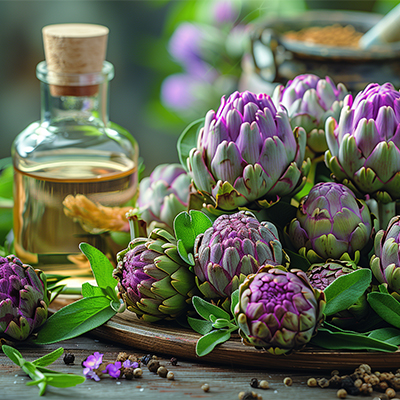
Thanks to bitter substances and enzymes, a naturally spring-fit and healthy digestion
Find out how bitter substances and enzymes stimulate your digestion, alleviate digestive problems and gently balance the gastrointestinal tract.
Bitters and enzymes naturally support digestion, relieve bloating and promote general well-being. Discover how you can get off to a fresh and stomach-friendly start with bitter foods, the right diet and high-quality food supplements. For a good gut feeling, day after day.

Clear head, full focus - with ginseng & ginkgo
More concentration, less stress: Natural support for everyday life
Spring brings fresh energy - but sometimes your head feels foggy rather than clear? Ginseng and ginkgo are proven plants that can help boost focus and mental performance. Whether for learning, at work or simply for more mental freshness - discover how this power combination can take your concentration to a new level!
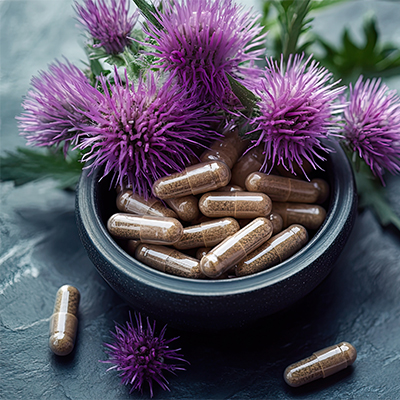
Springtime is liver time! How milk thistle & choline take the strain off your liver
Find out how choline, milk thistle and a conscious diet regenerate your liver and support your metabolism in a natural way.
After months of heavy eating, your liver also needs a break. Choline and milk thistle promote natural detoxification, strengthen the fat metabolism and provide fresh energy for body and mind. Discover how you can make your liver fit for spring with targeted nutrition and vital substances. Scientifically sound and naturally effective.

Iron deficiency? How iron tablets support your vitality
In the cold season, a sufficient iron level is particularly important for energy, blood formation and well-being.
Find out which iron supplements optimally support the body, what you should pay attention to when taking them and how you can specifically prevent iron deficiency. For more strength and vitality in winter!
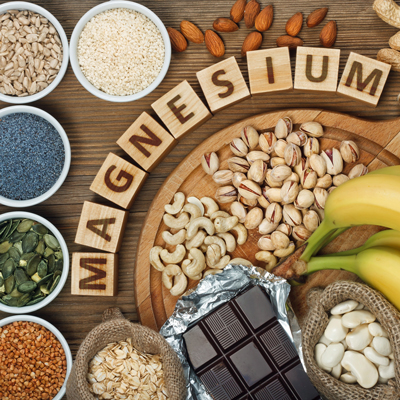
Strengthening the immune system in the cold season. Magnesium as a key mineral
Find out why magnesium is essential for a strong immune system and how you can optimally cover your requirements.
Especially in the cold season, magnesium supports the body's own defenses, ensures normal muscle function and helps to maintain energy. Discover magnesium-rich foods and practical nutrition tips for resilient health in winter!
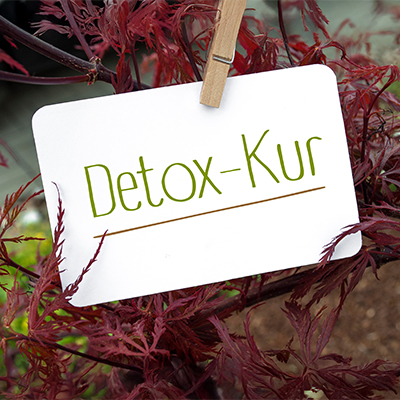
Detox cure with L-arginine: Detoxify & recharge your energy
Find out how L-arginine supports your detoxification, boosts your metabolism and improves your athletic performance.
With a 5-day detox plan, you can cleanse your body in a targeted manner, promote blood circulation and increase your well-being. For more energy and an all-round good feeling!

Goodbye winter skin: Radiant skin with biotin, hyaluronic acid & omega-3
Discover the best nutrients for supple and resilient skin in the cold season.
Biotin promotes skin renewal, hyaluronic acid provides deep moisture and omega-3 strengthens the skin's protective barrier. Find out how you can optimally care for your skin and enjoy the winter with a radiant complexion!

Support hormonal balance in spring naturally with monk's pepper and vitamin B6
For a stable cycle and greater well-being
Spring brings change - also for the hormone balance. Monk's pepper and vitamin B6 can help to alleviate PMS symptoms and regulate the menstrual cycle. Discover natural ways for more balance and well-being!

Radiant skin in spring with zinc and OPC
Support skin renewal and bring back the natural glow
Now that spring is here, your skin needs new energy. Find out how you can improve the appearance of your skin with targeted care, zinc and OPC - for a fresh, radiant complexion in spring. Find out more now!
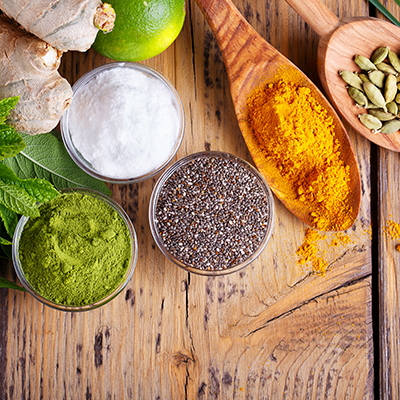
Winter salad with chia: Superfood for the cold season
Discover delicious and nutritious winter salad recipes with chia seeds, turmeric and fresh winter vegetables.
Chia provides valuable omega-3 fatty acids and fiber, while crunchy ingredients ensure enjoyment and variety. Be inspired and enjoy healthy, delicious salads in winter!
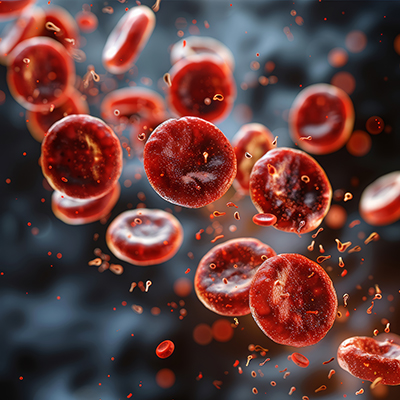
More oxygen, more energy: Iron and vitamin C as a spring turbo
Are you already feeling the spring, but not yet at full power?
Maybe your body is missing just the right combination of iron and vitamin C! Find out why these two nutrients can increase your blood oxygen saturation - and how you can regain your vitality in no time at all. Leave fatigue behind and start the warm season with fresh energy!

Activate metabolism for more energy with L-carnitine & omega-3
How to keep your body active without dieting stress
Spring is calling, and with it comes the desire for more energy and a fit body. L-carnitine and omega-3 fatty acids can gently support your metabolism by boosting fat burning and reducing oxidative stress. Find out why now is the perfect time to give your system a boost!

Support for Picky Eaters
When children's picky eating behavior endangers the nutrient supply
Does your child consistently refuse vegetables and only accepts a handful of foods? Here you can find out what is behind the so-called “picky eater syndrome”, why vitamin C is so essential for children's development and which tricks help to defuse picky eating behavior without pressure.
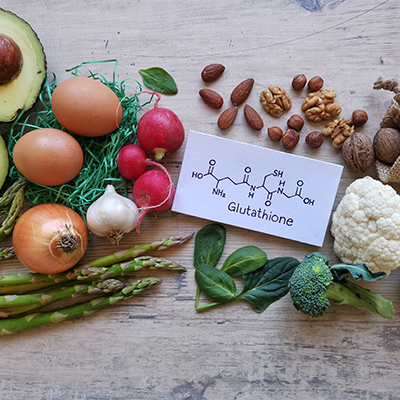
Liver detox with L-glutathione: fresh energy for spring!
Gentle detoxification instead of a crash cure - how L-glutathione supports the liver
The liver filters toxins out of the body and optimally utilizes nutrients. But how can you strengthen it naturally without going on extreme detox cures? Discover here what glutathione has to do with the liver and which simple home remedies can help with “spring cleaning” from the inside.
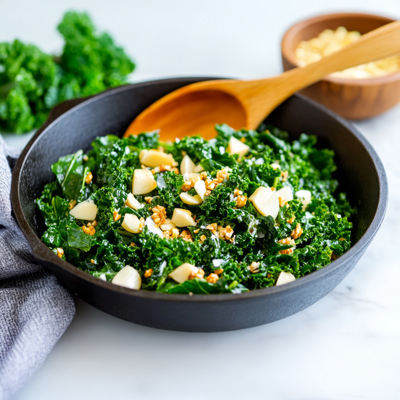
Winter cabbage & iron: Powerful nutrients for the cold season
Find out how winter cabbage, vitamin C and iron-rich foods support your health and provide your body with optimum care.
Winter cabbage provides valuable iron, which is absorbed even better with vitamin C. Discover delicious recipes and nutrition tips to keep you fit and full of energy throughout the winter!
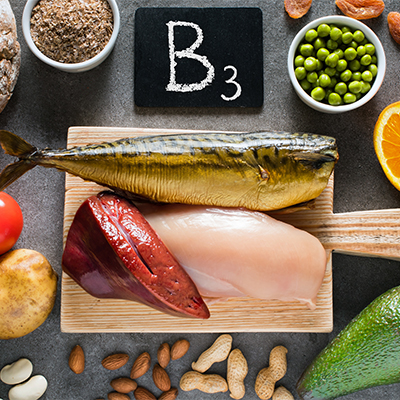
Protection for your mucous membranes with vitamin B3 (niacin)
Cold air outside, dry heating air inside - this can put a strain on mucous membranes
Find out how micronutrients such as niacin (vitamin B3) can help to support the natural barrier function of the mucous membranes and effectively counteract dryness. An adequate supply of vitamin B3 can help to maintain the well-being of your skin and mucous membranes during the cold season.

Sleeping problems in winter? How magnesium supports your sleep!
How magnesium can contribute to a relaxed night
Winter not only brings cold temperatures, but often also restless nights. Many people toss and turn in bed, struggle with muscle tension or wake up tired in the morning despite getting enough sleep. Magnesium is an essential nutrient that plays a role in muscle relaxation and the sleep-wake rhythm. In this article, you will find out which magnesium supplements are suitable for the evening hours and how you can promote a restful night's sleep with simple routines.

More energy in winter: Ashwagandha as natural support
How the adaptogen can help alleviate the winter blues.
The dark season can not only dampen your mood, but also cause persistent tiredness and listlessness. When energy is lacking and exhaustion remains even after a good night's sleep, the right support for body and mind may be lacking. Ashwagandha is a traditional adaptogen that can help promote inner calm and stabilize the sleep-wake cycle. Find out how you can support your well-being in winter with simple measures and a targeted supply of nutrients.

Constant tiredness despite sleep? How vitamin B complex gives you new energy
More energy, better concentration and less fatigue - this is how B vitamins support your body in winter.
Do you know the feeling of waking up completely exhausted in the morning, even though you've actually had enough sleep? Winter fatigue often robs us of energy, especially in the darker months of the year. The good news is that your body can do more than you think - it just needs the right stimuli! Find out how a vitamin B complex can help you reduce fatigue, boost concentration and get through the winter with more energy. Read now how you can specifically support your energy metabolism!
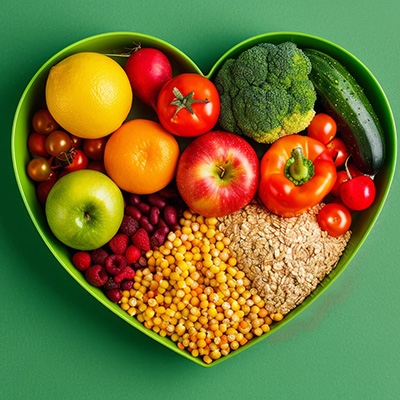
Strengthen your family with a vitamin boost in winter
Little sunlight, fluctuating temperatures and waves of colds challenge the immune system. Find out how you can get through the cold season healthy and full of energy with vitamin C!
Find out which symptoms indicate a vitamin C deficiency, which foods are real vitamin C bombs and how you can easily integrate your daily intake into your everyday life. Whether for parents, children or older people - with the right nutrients, the whole family can stay strong!
Secondary plant substances: important for our health
Secondary plant compounds have only recently attracted the attention of science and the health industry. As their name suggests, phytochemicals are found exclusively in plants and are known to provide numerous health benefits that go beyond the basics provided by our usual nutrients.
But what exactly are phytochemicals and how can they positively influence our well-being? We answer these and other questions about phytochemicals in this article.
What are secondary plant substances?
Secondary plant substances, also known as phytonutrients, are chemical compounds produced by plants. In contrast to the primary plant substances, which are essential for the growth and development of the plant, secondary plant substances play a supporting role. For example, they serve as natural defense mechanisms against pests, UV radiation or other environmental influences.
These substances are not essential for the human body, but can still offer a variety of health benefits. The German Nutrition Society emphasizes the importance of these substances for a healthy diet and recommends consuming a variety of plant-based foods in order to benefit from the positive effects of phytochemicals [1].
What different plant substances are there?
Secondary plant substances can be divided into various groups that differ in their chemical structure and specific effects. This diversity enables them to offer a wide range of health benefits.
The best-known groups include:
Carotenoids: These colorants give fruit and vegetables their yellow, orange and red hues. Beta-carotene, a typical representative of this group, is found in carrots and pumpkins, for example. Carotenoids are not only important for plant pigmentation, but also play a role in human health by acting as antioxidants and can support eye health. [2]
Flavonoids: This group includes a variety of compounds found in almost all plants. They are known for their strong antioxidant effects and are found in high concentrations in berries, citrus fruits and green tea. Flavonoids also contribute to cardiovascular health by improving blood vessel function and exhibiting anti-inflammatory properties. [3]
Polyphenols: This group includes a variety of compounds found in fruits, vegetables, nuts and beverages such as coffee and red wine. They are known for their antioxidant and anti-inflammatory properties, which can help reduce the risk of chronic diseases [4]. Polyphenols can also positively influence the microbiota in the gut, which in turn has an effect on the immune system.
Glucosinolates: These sulphur-containing compounds are typical of cruciferous vegetables such as broccoli, cabbage and Brussels sprouts. They give these vegetables their characteristic, slightly bitter taste. When consumed, glucosinolates can be converted into biologically active compounds that can reduce the risk of cancer and promote detoxification processes in the body [5].
Essential oils: These volatile compounds are responsible for the fragrance and flavor of many herbs and spices. In addition to their sensory properties, they also have potential health benefits as they can have antimicrobial and anti-inflammatory properties. [6]
Saponins: These compounds are found in legumes and some vegetables. They can reduce cholesterol absorption in the intestine and possibly protect against certain types of cancer. [7]
Phytoestrogens: These plant compounds are similar in structure to human oestrogen. They are mainly found in soy products and flaxseed and may influence the risk of hormone-dependent cancers [8].
Sulphides: These sulphur-containing compounds are mainly found in garlic and onions. They may have antibacterial properties and may reduce the risk of cardiovascular disease. [9]
Chlorophyll: The green pigment in plants has antioxidant properties and may help detoxify the body. [10]
Are phytosterols secondary plant substances?
Yes, phytosterols are secondary plant substances. They even deserve special attention, as they can play an important role in lowering cholesterol levels.
Phytosterols, also known as plant sterols, are very similar to cholesterol in their chemical structure. This similarity is the key to their cholesterol-lowering effect. When you eat foods containing phytosterols, they compete with cholesterol in the intestine for absorption into the body. As phytosterols are less well absorbed by the body than cholesterol, this leads to reduced cholesterol absorption. [11]
Phytosterols occur naturally in many plant foods, especially in:
- Vegetable oils (e.g. sunflower oil, rapeseed oil)
- Nuts and seeds
- Wholegrain products
- Legumes
- Fruit and vegetables
In recent years, the food industry has also started to enrich certain products with phytosterols to increase their cholesterol-lowering effect. For example, you can find margarine or yogurt drinks with added phytosterols in the supermarket. The cholesterol-lowering effect of phytosterols is scientifically well documented. But beware: according to one study, excessive phytosterol levels can lead to an increase in the risk of heart attack in coronary heart patients [12].
Health-promoting effect of phytochemicals
Although phytochemicals are often only found in small quantities in our food, they can have a significant impact on our health:
Antioxidant effect: Many phytochemicals act as antioxidants. This means that they can neutralize free radicals, which can otherwise cause cell damage and contribute to premature ageing and various diseases [13].
Anti-inflammatory properties: Some phytonutrients can reduce inflammatory processes in the body. This is particularly important as chronic inflammation is associated with many diseases.
- Cancer prevention: Certain phytonutrients may be able to reduce the risk of various types of cancer.
- Cardiovascular protection: Some phytonutrients can lower cholesterol levels, regulate blood pressure and thus reduce the risk of cardiovascular disease.
- Support of the immune system: Certain phytonutrients can strengthen the function of our immune system and thus better protect us against infections.
- Protection against UV radiation: Some phytonutrients, in particular certain carotenoids, can provide natural protection against harmful UV radiation.
How to make the most of phytochemicals for your health
To prevent health risks and benefit as much as possible from the positive effects of phytochemicals, we have a few tips for you:
Eat colorful food: Different colors of fruit and vegetables often represent different phytochemicals. Red tomatoes, for example, contain lycopene, while green broccoli is rich in glucosinolates. The more colorful your plate, the more diverse the phytonutrients.
- Eat seasonally: Fruit and vegetables that are harvested at the right time of year often contain more phytonutrients.
- Gentle preparation: Many phytonutrients are sensitive to heat. Steaming or briefly sautéing can help to preserve more of these valuable compounds.
- Don't peel: In many types of fruit and vegetables, the phytochemicals are located directly under the skin. If possible, eat the peel as well.
Combine wisely: Some phytochemicals are better absorbed by the body when they are combined with certain other nutrients. For example, beta-carotene is better absorbed when consumed together with some fat.
- Go for whole grains: whole grain products contain more phytochemicals than highly processed grain products.
- Don't forget herbs and spices: these are also rich in phytochemicals and can enhance your meals not only in terms of taste but also in terms of health.
Superfoods and phytochemicals
Superfoods have attracted a lot of attention in recent years, and not without good reason. These special foods are rich in phytochemicals that have a variety of health-promoting properties. Among the best-known representatives are goji berries, acai, matcha tea and chia seeds, all of which have impressive bioactive compounds.
Goji berries are an excellent example: they contain high amounts of carotenoids, especially zeaxanthin, which is important for the health of our eyes. Acai berries also stand out as they are rich in anthocyanins - a group of flavonoids that have strong antioxidant properties and can therefore contribute to cell health. Matcha tea impresses with its high content of catechins, in particular epigallocatechin gallate (EGCG), which is known for its potential anti-cancer properties [14]. Chia seeds, on the other hand, contain lignans, which have estrogenic effects and may reduce the risk of hormone-dependent cancers. The miracle tree moringa is also a popular superfood [15].
How many phytochemicals do humans need?
There is no specific, universally valid recommendation for the daily intake of phytochemicals. The reason for this is that there is a wide variety of these compounds and their effects are complex and often synergistic. Instead, nutrition experts generally recommend following a varied and plant-based diet to benefit from the health benefits of phytochemicals.
Secondary plant substances - little helpers with a big effect
Secondary plant substances are nature's true miracle cures. Although they are only found in small quantities in our food, they can have a significant impact on our health. From lowering cholesterol levels and protecting against free radicals to supporting our immune system: the positive effects of these plant compounds are manifold and should not be ignored.
Secondary plant substances work best as part of a balanced, plant-based diet. Individually isolated substances in the form of food supplements may not have the same effect as the naturally occurring compounds in food.
The message is therefore clear: a diet rich in fruit, vegetables, wholegrain products, nuts and pulses not only prevents vitamin deficiency and provides important minerals, but also a wealth of health-promoting secondary plant substances.
By enriching your diet with a variety of plant-based foods, you are doing something good for your body and investing in your long-term health. Secondary plant substances may be small, but their effect is huge. They are another good reason to put more plants on our plates: cheers to the power of nature!
Sources
[1] https://www.dge.de/wissenschaft/fachinformationen/sekundaere-pflanzenstoffe-und-die-gesundheit/[2] https://www.studysmarter.de/studium/lebensmittelwissenschaften/naehrstoffe-lebensmittelwissenschaften/carotinoide/
[3] https://www.spektrum.de/news/flavonoide-sekundaere-pflanzenstoffe-schuetzen-die-blutgefaesse/2243404
[4] https://pubmed.ncbi.nlm.nih.gov/33477894/
[5] https://pubmed.ncbi.nlm.nih.gov/33456268/
[6] https://meingesundheitstest.de/aetherische-oele-gegen-chronische-entzuendungen/
[7] https://www.bdc.de/warum-sekundaere-pflanzenstoffe-vor-krebs-schuetzen-koennen/
[8] https://pubmed.ncbi.nlm.nih.gov/36753952/
[9] https://www.verbraucherservice-bayern.de/themen/ernaehrung/sulfide-eine-gruppe-der-sekundaeren-pflanzenstoffe
[10] https://lpi.oregonstate.edu/mic/dietary-factors/phytochemicals/chlorophyll-metallo-chlorophyll-derivatives
[11] https://www.medmedia.at/apotheker-krone/phytosterine-natuerliche-optimierung-der-blutfette/
[12] https://www.imd-berlin.de/spezielle-kompetenzen/nahrungsmittelshyunvertraeglichkeiten/phytosterin-resorption
[13] https://www.bzfe.de/ernaehrung/ernaehrungswissen/essen-und-wissen/sekundaere-pflanzenstoffe/
[14] https://pubmed.ncbi.nlm.nih.gov/32660101/
[15] https://www.vitalstoff-lexikon.de/Sekundaere-Pflanzenstoffe/nbspLignane/Interaktionen
